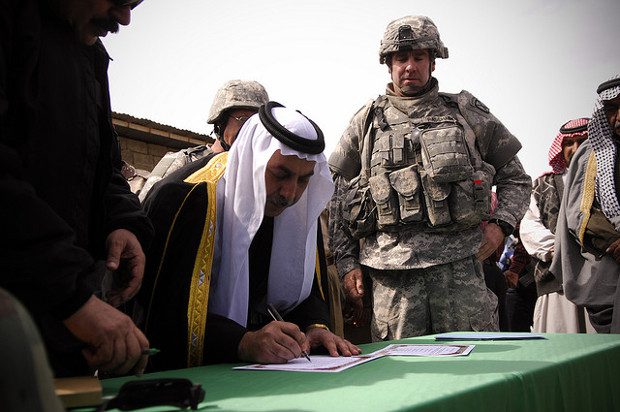Why Sunnis Won’t Fight ISIS

Iraq’s Sunnis won’t fight ISIS for the U.S., says NIQASH, a non-profit media organization operating out of Berlin. Without Sunni support, Obama’s war in Iraq cannot succeed. Here’s why.
Negotiations Fail
According to NIQASH, a source at the U.S. embassy in Baghdad said there have been secret negotiations between various Sunni Muslim armed factions, via Arab and Iraqi Kurdish intermediaries, for the past three months. At the request of U.S. diplomats and military personnel, Shia officials from the Iraqi government have also met with these groups in Erbil, Kurdistan and Amman, Jordan.
At the same time Gen. John Allen, Obama’s appointed coordinator of U.S. efforts in Iraq, has been trying to contact the Sunni tribal leaders he worked with in Anbar during the previous war’s “Awakening.” “But it was surprising,” a NIQASH source reported, “Most of General Allen’s former allies refused to cooperate with us. And some of them are actually now living outside of Iraq because of the Iraqi government’s policies.”
With some irony, America’s failure to secure the 2006 Awakening caused those Sunnis sympathetic to America’s aims to flee Shia persecution. Those “good guys” are thus not available in 2014 to help out America in the current war.
ISIS and the Sunnis
When ISIS first took control of Sunni areas in western Iraq, anger towards the Shia government in Baghdad caused many to see them as liberators. The Iraqi army, along with paramilitary police from the Interior Ministry, had engaged in a multi-year campaign of beating, imprisoning, and arresting Sunnis, to the point where many felt that Baghdad was occupying, not governing. For the Sunnis and ISIS, the Baghdad government was a common enemy, and a marriage of necessity formed.
Events in Baghdad do little to assuage Sunni fears. A recent report suggests the new Iraqi Prime Minister, almost certainly against America’s wishes, will nominate a Shia Badr Militia leader as Interior Minister. Since the Shias took control of Iraq following the American invasion of 2003, the Interior Ministry, which controls the police and the prisons, has been a prime tool of repression and punishment.
Still, cracks in the ISIS-Sunni relationship have started to form. Many of the Sunni groups, especially those led by former Baathists, are largely secular in nature, seeing their Sunni ties as broadly cultural rather than strictly religious. ISIS’s requests to pledge allegiance to its cause, coupled with demands to implement Sharia law, have created friction. Some internecine fighting has taken place. The U.S. has sought to exploit these issues to break the indigenous Sunnis away from ISIS, and ultimately to turn the Sunnis into American proxy boots on the ground, as was done with the Kurds.
Obama’s problem is that most Sunnis are fearful about cooperating via America with the Shia government in Baghdad. They believe history will repeat itself and the Americans and the Shia government will betray them, exactly as they betrayed them only a few years ago when the Awakening movement collapsed.
Sorry Mr. President
The Sunnis seem to be choosing a middle ground, one which does not serve Obama’s interests.
According to a 1920s Revolution Brigade Sunni leader, various militias came to the decision “not to support the international coalition against ISIS.” They also decided not to cooperate with ISIS, saying “If the Iraqi army or the Shia militias attack Sunni areas we control, we will fight both groups.”
“We are against the acts of the hard-line Islamic State. And we are also against bombed cars exploding randomly in Baghdad,” Abu Samir al-Jumaili, one of the Sunni Mujahideen Army’s leaders in Anbar province, told NIQASH. “However we are also opposed to the government’s sectarian policies against Sunnis… In 2006 we cooperated to expel al-Qaeda from Sunni cities but the government did not keep its end of the bargain. They chased our leaders and arrested us … The ISIS group are terrorists but so are the Shia militias.”
History is a Witch
There is no path by which America can succeed in its goals in Iraq—repel ISIS and keep the country together—without the active participation of the Sunnis. It is very unlikely that will happen.
Obama’s strategy rests on the assumption that the Sunnis can be bribed and coerced into breaking with ISIS, no matter the state of things in Baghdad. That’s hard to imagine. As with al-Qaeda in Iraq during the American occupation years, the Islamic State is Sunni muscle against a Shia government that, left to its own devices, would continue to marginalize, if not simply slaughter, them. In 2006, U.S. officials did indeed convince Sunni tribal leaders into accepting arms and payments in return for fighting al-Qaeda. That deal, the Awakening, came with assurances that the United States would always stand by them.
America didn’t stand. Instead, it turned the program over to the Shia government and headed for the door marked exit. The Shias reneged on the deal.
Once bitten, twice shy, so why, only a few years later, would the Sunnis go for the same bad deal? It appears they will not, and that by itself suggests the current Iraq war will not succeed. It is foolish for Obama to expect otherwise.
Peter Van Buren blew the whistle on State Department waste and mismanagement during the Iraqi reconstruction in his first book, We Meant Well: How I Helped Lose the Battle for the Hearts and Minds of the Iraqi People. His new book, Ghosts of Tom Joad: A Story of the #99Percent, is available now.